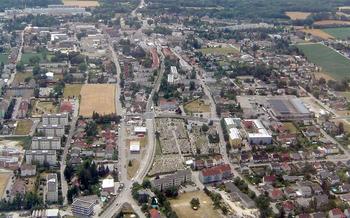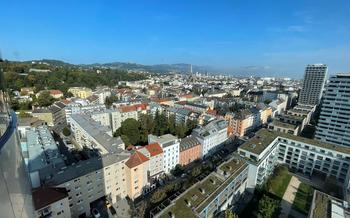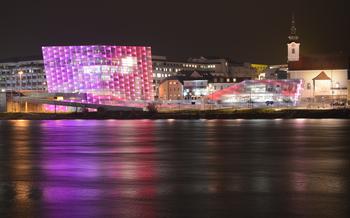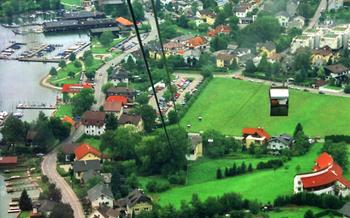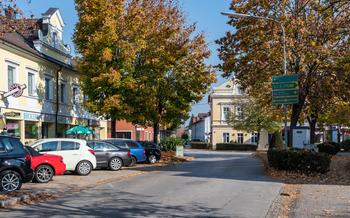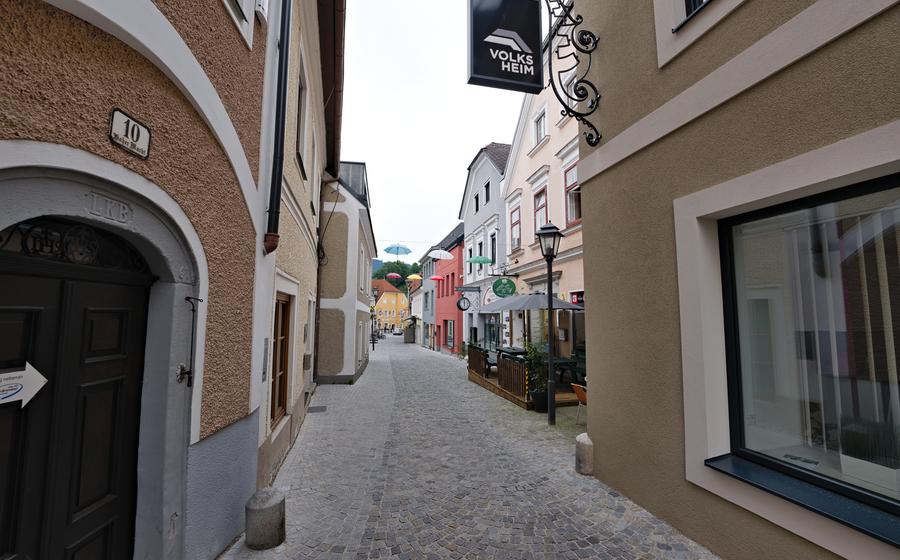
Mauthausen Memorial
- Exploring the Camp Grounds: A Journey Through History
- Voices of Resilience: Uncovering the Stories of Mauthausen Survivors
- Mauthausen Today: A Place of Reflection and Learning
- Planning Your Visit: Practical Information
- The Legacy of Mauthausen: Confronting the Past
- Remembering the Victims: Honoring Their Lives
- The Role of the Mauthausen Memorial in Education
- The Mauthausen Memorial as a Place of Research
- The Impact of the Mauthausen Memorial on Visitors
- Preserving the Memory of Mauthausen: Challenges and Opportunities
- The Mauthausen Memorial in Popular Culture
- Mauthausen Memorial and the Local Community
- Insider Tip: Exploring Beyond the Memorial
Exploring the Camp Grounds: A Journey Through History
The Mauthausen Memorial stands as a chilling reminder of the atrocities committed during World War II. As you wander through the preserved barracks and guard towers, you'll gain a glimpse into the harsh conditions endured by prisoners. The crematorium and gas chamber, symbols of the unimaginable suffering inflicted upon countless individuals, serve as a stark reminder of the horrors of the Nazi regime.
Explore the quarry where prisoners were forced to work under inhumane conditions, and climb the symbolic stone steps that represent their arduous labor and resilience. Pay tribute to the victims at the various memorial sites, including the Bell of Peace and the Wall of Names, which honor their memory and serve as a reminder of the profound loss suffered during this dark chapter in history.
Voices of Resilience: Uncovering the Stories of Mauthausen Survivors
The Mauthausen Memorial pays tribute to the victims of the Nazi regime by preserving their stories and experiences. Through survivor testimonies, memoirs, and historical research, visitors gain a profound understanding of the suffering endured by prisoners.
Exposing the atrocities committed at Mauthausen, these accounts offer a glimpse into the resilience and determination of those who survived the camp's horrors. Visitors can read excerpts from survivor testimonies, such as those of Simon Wiesenthal, who dedicated his life to hunting down Nazi war criminals, or Hermann Langbein, a survivor who became a prominent historian and author.
The memorial also conducts ongoing research to uncover hidden histories and untold stories of Mauthausen prisoners. Through archival research, interviews with survivors and their families, and international collaboration, the memorial strives to bring to light the experiences of all who were affected by the camp's existence.
Commemorative events and exhibitions honor the memory of victims and survivors. These events provide a platform for survivors to share their stories and for visitors to pay tribute to the resilience and strength of those who endured the unimaginable. Educational workshops and seminars delve deeper into the history and impact of the camp, offering participants the opportunity to engage with experts and gain a comprehensive understanding of Mauthausen's role in the Nazi regime.
Mauthausen Today: A Place of Reflection and Learning
The Mauthausen Memorial is not just a place of remembrance but also a center for education and learning. The memorial offers a range of educational programs, workshops, and seminars that delve deeper into the history and impact of the camp. These programs are designed for visitors of all ages and backgrounds, including school groups, university students, and the general public.
The memorial's research center conducts ongoing research on the history of the camp, its prisoners, and the Nazi regime. The center's findings contribute to a deeper understanding of the camp's operation and the atrocities committed there. The memorial also houses an extensive documentation center, which contains a wealth of historical documents, photographs, and artifacts related to the camp. These resources are available to researchers, educators, and the public, providing valuable insights into the history of Mauthausen and the Holocaust.
Throughout the year, the memorial hosts remembrance events and ceremonies to honor the victims of the camp. These events bring together survivors, their families, and the local community to remember the lives lost and to reaffirm the commitment to fighting against intolerance and discrimination.
Planning Your Visit: Practical Information
Visiting the Mauthausen Memorial is a profound and emotionally charged experience that requires careful planning. Here's some practical information to help ensure a meaningful and respectful visit:
-
Getting There: The memorial is conveniently accessible by public transportation from Linz, the nearest major city. Alternatively, you can drive your car, and on-site parking is available. Directions and parking information are provided on the memorial's website.
-
Guided Tours: Guided tours of the memorial are highly recommended, as they offer a deeper understanding of the camp's history and significance. Tours are available in several languages, including English, German, French, and Spanish. Booking in advance is advisable to secure a spot.
-
Accessibility: The memorial is committed to ensuring accessibility for all visitors. Wheelchair accessibility, ramps, and other facilities for visitors with disabilities are available. If you have specific accessibility needs, please contact the memorial in advance to make arrangements.
-
Visitor Etiquette: Respectful behavior and appropriate dress are expected when visiting the memorial. Silence and contemplation are encouraged out of respect for the victims and their families. Photography is permitted, but using flash or taking photos of survivors or visitors is prohibited.
The Legacy of Mauthausen: Confronting the Past
The legacy of the Mauthausen concentration camp extends far beyond its physical existence. In the aftermath of World War II, numerous trials were held to bring perpetrators of war crimes and crimes against humanity to justice. These trials, including the Mauthausen Trial held in 1946, played a crucial role in exposing the atrocities committed at the camp and ensuring that those responsible were held accountable.
The memory of Mauthausen has been preserved and commemorated in various forms, including museums, memorials, and educational institutions. The Mauthausen Memorial Museum, located on the site of the former camp, serves as a powerful reminder of the horrors that took place there. It houses a vast collection of artifacts, documents, and personal testimonies that shed light on the camp's history and the experiences of its prisoners.
Controversies and debates continue to surround the history and legacy of Mauthausen. Some debates center on the camp's role within the larger system of Nazi concentration and extermination camps, as well as the extent of collaboration between local authorities and the camp administration. Others focus on the challenges of preserving the memory of the camp while also acknowledging the need for reconciliation and healing.
The Mauthausen Memorial stands as a stark reminder of the darkest chapter in human history. By confronting the past and acknowledging the suffering of its victims, the memorial serves as a powerful symbol of remembrance, reconciliation, and the fight against intolerance and hatred. Its legacy continues to shape how we understand and learn from the atrocities of the Holocaust, ensuring that the memory of Mauthausen remains a vital part of our collective consciousness.
Remembering the Victims: Honoring Their Lives
The Mauthausen Memorial honors the memory of the victims through various initiatives and commemorative events. Personal stories and biographies of victims provide a glimpse into their lives, experiences, and the suffering they endured. Memorial artwork and installations serve as a powerful reminder of the atrocities committed and the resilience of the human spirit. Commemorative ceremonies and events pay tribute to the victims and their families, fostering a sense of remembrance and solidarity. Educational initiatives aimed at younger generations help ensure that the memory of the victims lives on and that the lessons of the past are not forgotten. Through these efforts, the Mauthausen Memorial strives to honor the victims and their legacy, promoting empathy, understanding, and a commitment to preventing future atrocities.
The Role of the Mauthausen Memorial in Education
The Mauthausen Memorial serves as a vital educational resource for schools, youth groups, and educators worldwide. Its comprehensive educational programs and resources aim to foster a deeper understanding of the Holocaust and its legacy among younger generations.
-
School Programs: The memorial offers a range of educational programs tailored to different age groups and curriculum needs. These programs include guided tours, workshops, and interactive activities that bring history to life for students.
-
Teacher Training: Recognizing the importance of well-informed educators, the memorial provides training and support for teachers to effectively teach about the Holocaust and Mauthausen. These training sessions equip teachers with the knowledge, resources, and pedagogical skills to facilitate meaningful discussions and learning experiences in the classroom.
-
Online Resources: The memorial's website hosts a wealth of online resources, including lesson plans, multimedia materials, and interactive activities, which educators can access and utilize in their teaching. These resources enhance the learning experience and provide students with a deeper understanding of the camp's history and significance.
-
Workshops and Seminars: The memorial organizes workshops and seminars for educators, researchers, and the general public to delve deeper into the history and legacy of Mauthausen. These events offer opportunities for participants to engage in critical discussions, share insights, and gain a comprehensive understanding of the camp's impact.
The Mauthausen Memorial as a Place of Research
The Mauthausen Memorial is not only a place of remembrance and education but also an active center of research. Historians, archaeologists, and researchers from various disciplines collaborate to deepen our understanding of the camp's history and its broader context. Historical research explores the political, social, and economic factors that led to the establishment of Mauthausen and its role within the Nazi regime. Archaeological investigations uncover physical remains and artifacts that shed light on the daily lives of prisoners and the operation of the camp.
The memorial's extensive archival collections, housing documents, photographs, and personal accounts, serve as a valuable resource for researchers. These collections provide insights into the experiences of prisoners, the camp's administration, and the broader history of the Holocaust. The memorial also collaborates with researchers and institutions worldwide, fostering international cooperation and knowledge-sharing. Through this ongoing research, the Mauthausen Memorial contributes to a more comprehensive and nuanced understanding of the camp's history and its enduring legacy.
The Impact of the Mauthausen Memorial on Visitors
The Mauthausen Memorial is a powerful site that evokes a range of emotions in visitors, including shock, sadness, anger, and a sense of responsibility. Many visitors find the experience of visiting the memorial to be transformative, leading to personal growth, increased empathy, and a commitment to social justice.
Visitors often share their experiences and reflections after visiting the memorial. Some express feelings of guilt and shame, recognizing the suffering that took place and the role that their own countries or ancestors may have played in the Holocaust. Others feel a sense of responsibility to learn from the past and to work towards a more just and peaceful world.
The memorial's staff is committed to providing visitors with a safe and supportive environment in which they can process their emotions and reflect on the history of the camp. Visitors are encouraged to share their thoughts and feelings with staff members or with other visitors, and there are many opportunities for dialogue and discussion.
The feedback from visitors is invaluable to the memorial, as it helps to improve the educational programs and services offered. The memorial strives to create a space where visitors can learn about the history of Mauthausen, reflect on its legacy, and make a personal commitment to fighting against intolerance and discrimination.
Preserving the Memory of Mauthausen: Challenges and Opportunities
The Mauthausen Memorial faces several challenges in preserving the memory of the camp while ensuring its accessibility to visitors. One key challenge is the physical deterioration of the camp's remains due to age, weather conditions, and vandalism. Ongoing conservation and restoration efforts aim to address this issue by stabilizing and repairing the structures while maintaining their historical integrity.
Another challenge is balancing accessibility with preservation. The memorial seeks to make the site accessible to visitors from all backgrounds and abilities while preserving its authenticity and respecting the victims' memories. This involves implementing measures such as providing ramps and wheelchair access, offering guided tours in various languages, and creating interactive exhibits that do not detract from the solemnity of the site.
Furthermore, the memorial grapples with ongoing debates and controversies surrounding its preservation and interpretation. Some debates center on the extent to which the site should be restored or left in its original state, while others focus on how to present the history of the camp in a way that is both accurate and respectful. The memorial strives to engage in open dialogue with various stakeholders, including survivors, historians, and the local community, to address these debates and find common ground.
Despite these challenges, the Mauthausen Memorial remains committed to preserving the memory of the victims and promoting remembrance and education. Future plans and initiatives include expanding educational programs, developing new exhibits, and collaborating with international partners to enhance the memorial's impact and reach. By addressing these challenges and embracing new opportunities, the memorial continues to serve as a powerful reminder of the atrocities committed during the Holocaust and the importance of fighting against all forms of intolerance and discrimination.
The Mauthausen Memorial in Popular Culture
The history of Mauthausen has resonated beyond historical accounts and memorials, finding its way into popular culture through various mediums. Films such as "The Counterfeiters" and documentaries like "Mauthausen: The Forgotten Concentration Camp" have brought the camp's horrors to a wider audience. Literature has also played a significant role, with books like "The Choice" by Edith Eger and "A Man's Search for Meaning" by Viktor Frankl sharing the personal experiences of survivors. Art installations and exhibitions have also emerged, using powerful visuals to convey the camp's legacy. These artistic expressions serve as a reminder of the atrocities committed and contribute to the collective memory of this dark chapter in history.
Mauthausen Memorial and the Local Community
The Mauthausen Memorial actively engages with the local community through various initiatives and programs. Educational workshops, outreach events, and collaborative projects provide opportunities for dialogue, understanding, and reconciliation. The memorial's goal is to foster a shared understanding of the past and its impact on the present.
Local residents share their perspectives and experiences, contributing to a multifaceted narrative of the camp's history. Challenges arise in addressing the complex emotions and memories associated with the site, but the memorial strives to create a space for open and respectful dialogue.
Building bridges between the past and the present is essential for healing and reconciliation. The memorial's efforts aim to promote a culture of remembrance, empathy, and social responsibility within the local community and beyond.
Insider Tip: Exploring Beyond the Memorial
While visiting the Mauthausen Memorial, take the opportunity to explore the surrounding region, which offers a wealth of historical, cultural, and natural attractions. Discover other historical sites and museums that provide insights into the history of the Holocaust and World War II. Immerse yourself in the local cuisine and culinary traditions, sampling traditional dishes and specialties that reflect the region's rich heritage.
Escape to the stunning natural beauty of the surrounding area, where you can embark on picturesque hikes, admire breathtaking views, and connect with the region's serene landscapes. Delve into the vibrant cultural heritage of the region by attending local events, visiting museums, and exploring historical landmarks that offer a glimpse into the past.
By venturing beyond the memorial, you'll gain a deeper appreciation for the region's history, culture, and natural wonders, creating a well-rounded and memorable travel experience.
